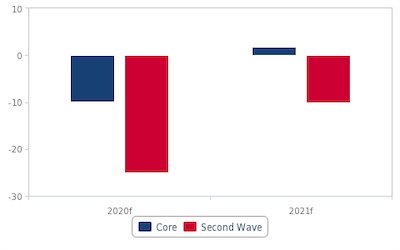Second COVID-19 Wave Could Stall Auto Industry Growth through 2021
The risk of a second wave of COVID-19 poses an additional threat to automakers' core automotive business but offers some significant upside potential for their venture into the medical device segment. This is according to a report from Fitch Solutions Country Risk & Industry Research.
April 16, 2020

According to Fitch Solutions Country Risk & Industry Research, a second wave of the COVID-19 outbreak could stall a recovery in the global automotive sector, even before it started. This is as the re-implementation or the extension of safety measures, such as movement and business operating restrictions, will see demand for new vehicles falling further.
|
Second wave of COVID-19—A Significant risk to autos sector; global vehicle sales growth — core and potential (2020–2021). Source: Fitch Solutions |
Fitch highlights that the second wave of the COVID-19 outbreak presents a significant downside risk to our already bearish vehicle sales outlook. As such, in the event of a second wave of COVID-19 outbreak, Fitch estimates that global vehicle sales could decline by up to 25% in 2020 and weaken further over the first half of 2021 to possibly reach a further contraction of 10% in 2021. This compares with a 9.9% contraction in 2020 if there is a single wave, followed by modest growth in 2021.
However, the second wave will further drive up demand for medical equipment, especially ventilators, which could see demand outstrip this current global estimate of 880,000, which further makes the case for automakers to produce medical equipment.
Given the investments automakers are putting into starting the production of medical devices, Fitch’s Pharmaceuticals and Healthcare team believe that automakers' medical device operations could continue even after the outbreak is over, which will increase the number of medical device companies globally. In Japan, both Honda and Toyota have medical device development divisions, which highlights the potential for other automakers such as Ford, GM and even Tesla to maintain their medical device partnerships and R&D centres, even after the COVID-19 pandemic subsides.
They also note that this will drive up competition and increase pricing pressures for medical device companies, particularly in the ventilator and medical mask markets. The consumables and therapeutic respiration apparatus markets will therefore receive a boost in 2020 as new competitors enter the market, before pricing pressures moderate growth thereafter. Fitch projects that the global consumables market will grow by 6.3% in 2020 to US$70 billion, up from 4.4% growth in 2019, while the global therapeutic respiration apparatus market will grow by 9.9% in 2020 to US$11.2 billion, up from 5.4% growth in 2019.
In the U.S., automakers have opted to partner with established medical device manufacturers, which have the expertise to produce medical equipment such as ventilators and, more importantly, have already received FDA approval for their devices. General Motors (GM) and Ford Motor both partnered with established and certified ventilator makers Ventec Life Systems and General Electric, respectively. This means that automakers will not have to go through the long and costly process of getting the ventilators they produce approved by the FDA. Furthermore, they started producing ventilators as soon as their plants have been retrofitted or retooled to produce these machines and start generating much-needed income.
Fitch has identified over 20 automakers entering or considering entry into the medical device industry amid COVID-19. These include India’s Mahindra & Mahindra (ventilators), Mercedes and Formula 1 (continuous positive airway pressure (CPAP) devices), Tesla (ventilators), Jaguar Land Rover (face shields), and Volkswagen (medical gowns, face masks and ventilators).
Fitch also notes that supply chain disruptions due to the coronavirus outbreak, as well as export bans in some countries, will boost medical device localization efforts in many countries, particularly countries that are most hit by the coronavirus such as the U.S., UK, Italy, Germany, France, and Spain.
About the Author(s)
You May Also Like


.jpg?width=300&auto=webp&quality=80&disable=upscale)

